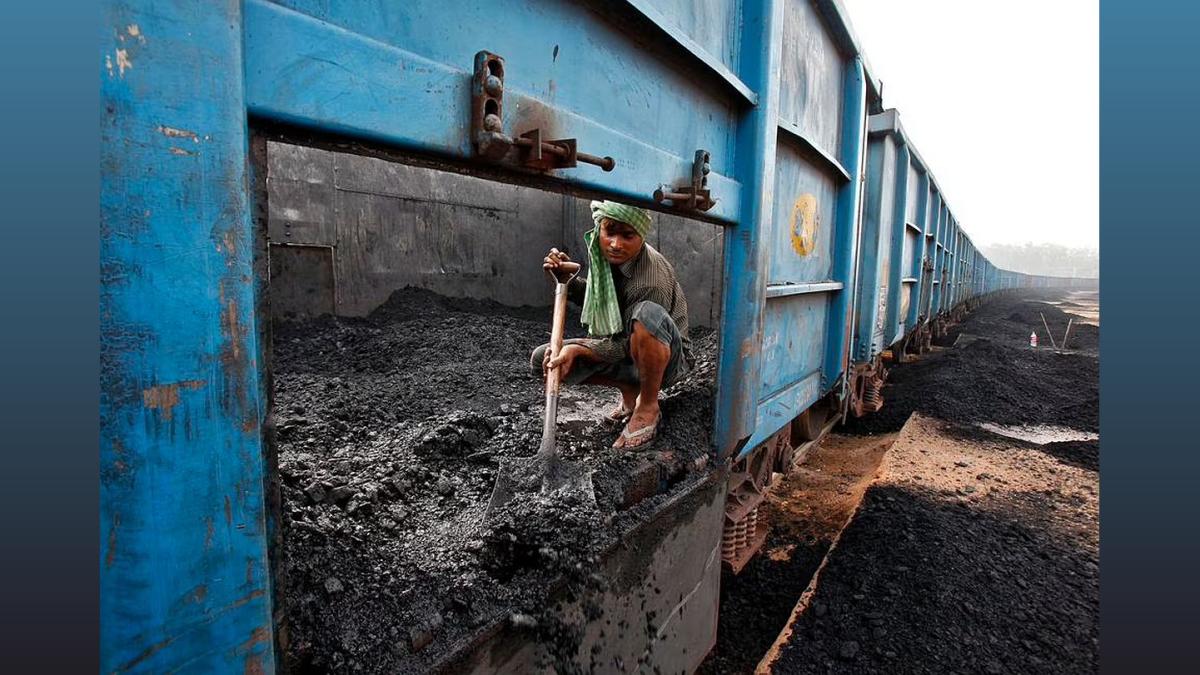Coal Shortage Probe Demanded: Power Engineers
AIPEF demands an independent probe into coal shortage at thermal plants and coal imports, citing potential benefits to certain entities.

Photograph: Ajay Verma/Reuters
New Delhi, Nov 28 (PTI) All India Power Engineers Federation (AIPEF) on Tuesday demanded an independent enquiry into shortage of coal at various thermal power plants as well as the imports of dry fuel in the country.
The engineers' body also said the central government should bear the additional cost of coal imports by power generation utilities, according to an AIPEF statement.
It said that certain entities are benefitting from rising coal imports and demand from a number of power producers leads to an increase in the price of the dry fuel in the international market.
AIPEF chairman Shailendra Dubey said the term of reference of the enquiry should include who are the main beneficiaries of coal imports.
According to AIPEF, imports of coal have increased after the government has made it mandatory for imported coal based plant to run with full capacity and instructed the domestic coal based plants to increase blending of imported coal from 4 per cent to 6 per cent.
In March this year, the government issued a directive under Section 11 of the Electricity Act, asking imported coal-based (ISB) power plants to operate at full capacity amid a surge in electricity demand and inadequate domestic coal supplies. Initially, the validity of the order was from March 16 to June 15, 2023. It was later extended till June 2024.
AIPEF statement said an independent enquiry should be conducted into the import of coal and a ban should be imposed on firing imported coal without scientific blending with domestic coal so as not to damage the boiler and power generation equipment.
In case the import of fuel is made mandatory for gencos (generation companies) then the Government of India should bear the additional cost so that it is not passed on to discoms (distribution companies) and the consumers, the statement said.
Also, power stations were required to install a system for sulphur removal since imported coals have sulphur content unlike Indian coals, it pointed out.
There is every reason to believe that the coal crisis was actually created to enable import of coal rather than import of coal being resorted to due to compulsions of a coal crisis, it stated.
In case coal import is necessary then independent import by several state governments from the same vendors will reduce the bargaining capacity of buyers and escalate the cost of coal, it said, adding that the procurement of imported coal should be centralized.
AIPEF further suggested the central government should ensure through Coal India Limited (CIL) that the imported coal is properly blended and supplied to various plants as per their requirement.
Improper blending is harmful for the health and longevity of the boilers, it said, adding that the price of the blended coal should be based on the same principles and basis as the pricing of the Indian coal.
The Government of India invoked its extraordinary powers under the Electricity Act, 2003 and imposed mandatory purchase and use of imported coal. This was done in total violation of the constitutional provision, it said.
The consequence of this is that the state utilities that are already loss-making will be declared as fit to be privatised or their assets monetised, it added.
The engineers' body also said the central government should bear the additional cost of coal imports by power generation utilities, according to an AIPEF statement.
It said that certain entities are benefitting from rising coal imports and demand from a number of power producers leads to an increase in the price of the dry fuel in the international market.
AIPEF chairman Shailendra Dubey said the term of reference of the enquiry should include who are the main beneficiaries of coal imports.
According to AIPEF, imports of coal have increased after the government has made it mandatory for imported coal based plant to run with full capacity and instructed the domestic coal based plants to increase blending of imported coal from 4 per cent to 6 per cent.
In March this year, the government issued a directive under Section 11 of the Electricity Act, asking imported coal-based (ISB) power plants to operate at full capacity amid a surge in electricity demand and inadequate domestic coal supplies. Initially, the validity of the order was from March 16 to June 15, 2023. It was later extended till June 2024.
AIPEF statement said an independent enquiry should be conducted into the import of coal and a ban should be imposed on firing imported coal without scientific blending with domestic coal so as not to damage the boiler and power generation equipment.
In case the import of fuel is made mandatory for gencos (generation companies) then the Government of India should bear the additional cost so that it is not passed on to discoms (distribution companies) and the consumers, the statement said.
Also, power stations were required to install a system for sulphur removal since imported coals have sulphur content unlike Indian coals, it pointed out.
There is every reason to believe that the coal crisis was actually created to enable import of coal rather than import of coal being resorted to due to compulsions of a coal crisis, it stated.
In case coal import is necessary then independent import by several state governments from the same vendors will reduce the bargaining capacity of buyers and escalate the cost of coal, it said, adding that the procurement of imported coal should be centralized.
AIPEF further suggested the central government should ensure through Coal India Limited (CIL) that the imported coal is properly blended and supplied to various plants as per their requirement.
Improper blending is harmful for the health and longevity of the boilers, it said, adding that the price of the blended coal should be based on the same principles and basis as the pricing of the Indian coal.
The Government of India invoked its extraordinary powers under the Electricity Act, 2003 and imposed mandatory purchase and use of imported coal. This was done in total violation of the constitutional provision, it said.
The consequence of this is that the state utilities that are already loss-making will be declared as fit to be privatised or their assets monetised, it added.
You May Like To Read
TODAY'S MOST TRADED COMPANIES
- Company Name
- Price
- Volume
- Vodafone-Idea-L
- 11.65 (+ 3.56)
- 106772451
- Alstone-Textiles
- 0.28 ( -3.45)
- 44187760
- Mangalam-Industrial
- 0.88 ( -2.22)
- 39177573
- Sunshine-Capital
- 0.27 (+ 3.85)
- 35956340
- GMR-Airports
- 104.40 (+ 6.37)
- 30453005






